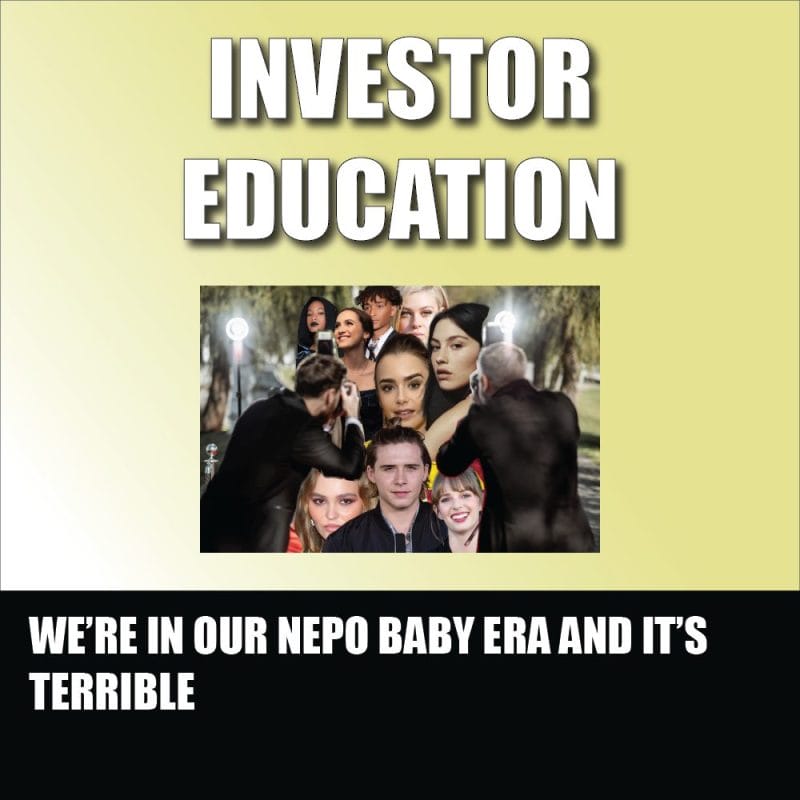My day was going fine – coffee was hot, snow made things still, the barista smiled at me. I had no real complaints, which is rare for me. And then I came across Brooklyn Beckham’s “photography book”.

Can you fathom approaching a publisher with a photography book that contains the caption “so hard to photograph but incredible to see.”?
I’m sure if you are not a person of either immense privilege or, at the very least, common sense, you cannot fathom such a thing. But there is a particularly unlikeable brand of human who can do embarrassing things and get away with it. And not even just get away with it – get paid for it.
You see where this is going. Naturally, my article about red-green candies, consumerism and nostalgia had to take an immediate back seat so I could rant about the infamous Nepo Baby.
What is a Nepo Baby?
It may sound like some sort of children’s craze – a new version of the Tamagotchi or the Neopet perhaps – but the reality is far more unseemly. The term, of course, refers to the children of nepotism. In other words, the opportunities granted to the nepo baby are based on the favoring of their parents.
In the current economic and political climate anything reeking of privilege demands to be dismantled, which may be why Paltrow’s comments struck a nerve and why #nepobaby is permanently #trending.
“Don’t You Know that We’re Toxic”?
Our resentment of the nepo baby may be especially raw today because of the overt nepotism that featured in former President Donald Trump’s administration. For 4 years his unelected, school-shooter energy son-in-law, with minimal policy experience, was one of the most powerful men in America, and his daughter a key adviser with a West Wing office.
I’d imagine, if I were a qualified person that was strong-willed enough to enter the world of American politics, this would all be very offensive.
And yet as much as we hate nepotism in politics — Americans fought a war so its rulers wouldn’t be divined by birth — we also romanticize it. Depending on your political party, we tend to admire dynasties like the Roosevelts, the Kennedys, the Bushes, even if those regimes have had a mixed record. And those dynasties don’t only extend to politics…
“Here’s Looking At You Kid” (Casablanca 1942)
If you don’t know who Lily Rose Depp is, you can probably take a shot in the dark and be right. The 23-year-old actress and model is the daughter of Johnny Depp and Vanessa Paradis. She is 5’2” and walks for Chanel. She has also disputed the idea that her parentage got her cast in projects.
“I can definitely say that nothing is going to get you the part except for being right for the part.”
(The worst brand of nepo baby is one that refuses to acknowledge their nepo-ness).
Can someone please tell Lily that in Hollywood, the framework for nepotism is harder to uproot than in other industries? The idiosyncratic financial ecosystem of the entertainment industry largely influences the rise of the nepo baby.
For a mid- or low-budget production, hiring the child of a famous star guarantees free and immediate publicity, intrigue, and name recognition, without the fees that usually come with that name. Social media has streamlined the process, too. Instagram has catapulted many a nepo baby into the limelight from a young age; some arrive at the gates of Hollywood with a following already millions strong.
Hollywood “Good” Nepo’s
There are ways in which nepotism in the entertainment industry is, in the long run, more meritocratic than other spheres of work. If Miley Cyrus couldn’t sing, she wouldn’t be performing at the Super Bowl.
Some remain immune to the stigma or transcend it through sheer talent – no one thinks of Nicolas Cage or Laura Dern as mere winners of the Beverly Hills lottery. Others, however, come to embody the worst kind of social imbalance.
Destroying the American Dream, One Nepo Baby at a Time.
Why do working class fans get so upset about nepotism babies? Dr Nilu Ahmed, a chartered psychologist (i.e., a person far more qualified than me) says it’s because it goes against a message we are told throughout our lives: that hard work is what gains us rewards.
“Through education systems and through the government, we are told that if you work hard enough, you can succeed and that’s something that is repeated in every workplace – that if you work hard for a promotion, you’ll get it,” Ahmed explains. But the very existence of nepotism – especially in extreme cases, where individuals can become famous millionaires thanks to family connections – throws that message into question.
The Undercover Nepo.
The true irritation comes when famous faces (ahem, Lily Depp) as well as people in our day-to-day lives, try to conceal how nepotism benefited their career trajectories. Often, working class fans idolize the supposed trajectories of celebrities as a symbol that hard work can achieve anything – if they can do it, anyone can.
“Our hope is so important. We hope to be a music artist, an actor, a performer, an academic in my case. Now I want to become a professor, if I suddenly see that, most people in the industry are there through nepotism, that’s a real shock…It tells us that no matter how hard we work, we will never get there.”
That’s what the pain is about. When you come from a disadvantaged socioeconomic background, you look for pathways out and try to spot routes that have been taken before. That’s why it’s such an immense let down to find out someone – celebrity or not – has lied about the journey you’ve pinned your very aspirations on.
Financial Take.
You didn’t think I was going to teach you nothing about finance, did you? Can’t be losing my job in this economy. I am, if you couldn’t already tell, not a nepo baby.
When British parliamentarian Liz Truss says she wants to give tax cuts to the wealthiest, she thinks she is making a moral argument. The rich deserve to keep their money because they are the best and brightest among us. They have succeeded on their own merit and not because of their class, sex, or ethnicity. (Eye roll).
This, she believes, is a fair view of society. But the crisis that this notion has imposed on the world is as much due to her misreading of modern history as of her economic illiteracy.
Highly Discriminating: Why the City Isn’t Fair
Author Louise Ashley wrote a book titled Highly Discriminating: Why the City Isn’t Fair and Diversity Doesn’t Work.
An investment banker told Ashley that “we only recruit from about five universities, really, but that’s definitely not what we say, and I’ll get in trouble with HR if I tell you anything else.”
In 2016, the US authorities fined JP Morgan $264 million after it generated business in Asia by hiring 100 interns and full-time employees at the request of Chinese government officials.
A City recruitment consultant told Ashley that globalization meant that “if your father is a minister in a trade delegation” you were in. Equally the old English class networks meant that “if your daddy knows someone on the buy side then a job could always be found.”
In the end…
The conclusion to Highly Discriminating is uncontroversial to those who study social mobility: corporate diversity programmes may help individuals, but they do not transform societies or even organisations – nor, in many cases, are they meant to. Diversity is sold as a business strategy that will increase profits, not justice.
You cannot, in other words, have a fair corporate culture in an unfair society. In all the interviews Ashley conducted, the saddest were with decent people in the financial industry, who had dedicated much of their lives trying to promote diversity and inclusion and were baffled that all they had achieved were cosmetic changes. They still did not realize that cosmetic change was the point of the process.
How do I stop Brooklyn Beckham from trying my industry for a spin?
Stifling the infernal “nepo baby” trend would require an intersectional and holistic re-appraisal of the way both the entertainment industry and society itself is structured.
Nepotism feeds into wider social divides that only a large-scale redistribution of wealth could hope to address. (See Just Billionaire Things for more on this). For now, just ranting about it may have to suffice. Don’t they say the first step has always been admitting there’s a problem?
Until the next.

